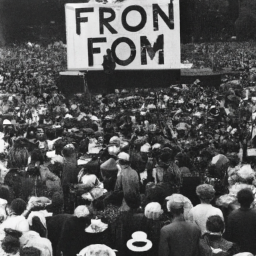The presidential campaign of 1964 was a pivotal moment in American politics, marked by controversy and political tensions that would shape the course of the country for years to come. At the center of the campaign was the Republican Party's nominee, Barry M. Goldwater, a conservative senator from Arizona who was seen as a staunch opponent of liberalism and social progress.
However, Goldwater's campaign was beset by a number of controversies, including his support for right-wing extremist groups and his opposition to the Civil Rights Act, which had been signed into law by President Lyndon B. Johnson earlier that year. The latter issue was particularly contentious, with many Democrats accusing Goldwater of being a racist and a segregationist.
The controversy surrounding Goldwater's campaign was further exacerbated by a group of psychiatrists that declared him mentally unfit to be president, provoking a backlash from Goldwater and his supporters. The incident highlighted the growing influence of mental health experts in American politics and raised questions about the role of mental health in the presidency.
Despite these challenges, Goldwater remained a popular figure within the Republican Party, which had been moving steadily to the right in the years leading up to the campaign. His emphasis on individual freedom and limited government resonated with many Americans who were disillusioned with the liberal policies of the Johnson administration.
On the Democratic side, Johnson enjoyed widespread support within his party and was seen as a strong leader who had successfully passed a number of important legislative initiatives, including the Civil Rights Act and the War on Poverty. However, his administration was increasingly mired in controversy over the Vietnam War, which was rapidly becoming a quagmire that many Americans opposed.
The 1964 campaign was also notable for its impact on foreign policy, with Goldwater advocating a more aggressive stance towards the Soviet Union and other communist regimes. This stance was seen as dangerous by many Americans who feared a nuclear war, and it ultimately contributed to Goldwater's defeat in the election.
Despite his loss, Goldwater's campaign had a lasting impact on American politics, paving the way for the rise of conservatism and the Republican Party's shift towards a more right-wing ideology. The 1964 election also highlighted the growing importance of social issues in American politics, with the Civil Rights Act and other progressive initiatives becoming key factors in electoral campaigns.
In the years since the 1964 campaign, American politics has continued to be shaped by the tensions between conservatism and liberalism, as well as by debates over social issues and foreign policy. The legacy of Goldwater's campaign remains a subject of debate, with some seeing it as a pivotal moment in the history of the Republican Party and others viewing it as a cautionary tale about the dangers of extremism in politics.
In conclusion, the 1964 presidential campaign was a pivotal moment in American politics that highlighted the growing tensions between conservatism and liberalism, as well as the importance of social issues and foreign policy in electoral campaigns. Goldwater's controversial campaign and his defeat at the hands of Johnson marked a turning point in American politics, paving the way for the rise of conservatism and the Republican Party's shift towards a more right-wing ideology. The legacy of the campaign remains a subject of debate and analysis, offering insights into the complex and ever-evolving nature of American politics.
Reference:
-
WASHINGTON -- President Joe Biden on Tuesday designated two new national ... area were already protected under the Wilderness Act of 1964.
-
As an English major in Vanderbilt University's class of 1964, she became the first female president pro tempore of the student senate.
-
A few weeks ago while doing a story on the Beatles' eventful 1964 visit to Jacksonville, I came across several photos of the band shot by Times-Union.
-
... which has held power in Syria since 1964. Shibli al-Ayssami, his great-uncle, was vice-president of Syria in the mid-1960s.
-
My philosophy of leadership is called “servant leadership,” which was developed by Robert K. Greenleaf in 1964 and refined by many others.
-
Like the president, López Hernández got his start in the PRI before ... Gustavo Díaz Ordaz (1964–70) and Luis Echeverría (1970–76) serve as...
-
... National Medals of Arts from US President Joe Biden this week. ... Knight & the Pips throughout the 1950s and again from 1964–1989.
-
... to the New York Knicks in the second round of the 1964 NBA Draft. ... In 2004, Reed took the position of vice president of basketball.
